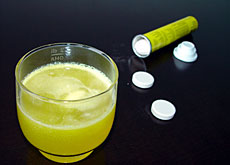Swiss consumers are still getting a raw deal

Switzerland lags behind the European Union when it comes to looking after consumers’ interests.
Forty years after the founding of the Consumer Protection Association, its president Simonetta Sommaruga tells swissinfo that Swiss consumers are still paying over the odds.
Sommaruga says Switzerland’s reputation as Europe’s “high-price island” is as deserving as ever, thanks to legislation skewed in favour of business, and a reluctance to push companies to offer value for money.
But business is not entirely to blame, according to Sommaruga. Swiss consumers have long believed that expensive means better, which means they pay as much as 30 per cent more than their EU counterparts for exactly the same products.
swissinfo: As the head of consumer protection, can you explain why producers are always trying to get the better of consumers?
Simonetta Sommaruga: I don’t think producers want to fleece consumers. But I do think producers have an unfair advantage in the sense that they have more information at their disposal. They use this knowledge to their advantage and often abuse it. Our task is to prevent this.
swissinfo: Who enjoys more protection in Switzerland – producers or consumers?
S.S.: If I look at the composition of parliament, then it is clear that producers are over-represented, and that is reflected in our legislation. Therefore we must and do fight continuously to establish the principle of consumer protection Switzerland, and that means more information for consumers and transparency.
swissinfo: As a consumer, surely I’m capable of protecting myself – of making my own decisions about what I buy and what I pay?
S.S.: We expect consumers to inform themselves. But they must have access to information in order to do so. What does someone do, for instance, when confronted with 13 pages of small print on an insurance contract? Even a lawyer would have trouble getting to grips with it all. There needs to be a mechanism to examine such things on behalf of the consumer, and appropriate legislation to deal with that.
swissinfo: Do we need to incorporate “training for consumers” into the education system?
S.S.: In other European countries that takes place as a matter of course, but not in Switzerland. I have the feeling that in this country it is not seen as desirable that consumers be well informed, independently minded and critical.
swissinfo: Where does Switzerland stand in relation to European Union legislation?
S.S.: There is a basic difference of attitude between the two. When a new product or technology comes on to the market in the EU, rules are established automatically to keep consumers informed of their options and to ensure that competition is preserved.
In Switzerland, consumer protection is seen as a laborious exercise and something that harms companies. The basic attitude is that it should be contained.
An investigation by the consumer protection agency showed that Switzerland immediately adapts to EU regulations when it is in the interests of the export industry, but fails to do so when it comes to protecting domestic consumers.
swissinfo: How long have we actually been “consumers”?
S.S.: Since we started buying from professional traders – a long time. Today of course people buy almost everything – as individuals we hardly produce anything for ourselves personally. Take food: between the farmer and the consumers there are innumerable middlemen; this weakens the position of consumers and makes them dependent on wholesalers, retailers, etc.
swissinfo: How did your organisation operate when it was set up 40 years ago?
S.S.: We started testing products early on, and publishing the names of the producers and manufacturers concerned.
Initially, our efforts drew strong protests, and even riots. There were demands that the test results be withheld from publication in the media, and we were often threatened with legal action. But I can truthfully say that not one case ever came to court.
swissinfo: What are your priorities today?
S.S.: In the past decades, the price consumers pay for services – banking, insurance and rent – has been rising continuously, while food costs have been falling. Consequently, we have been focusing more and more on services. The cost of health care is also rising.
Another area where consumer protection is needed concerns new food production methods, and the genetic manipulation of crops, which are a frequent cause of scandal.
swissinfo: What advice do you have for consumers? And what still needs to be done on a legislative level?
S.S.: Consumers must become more critical. In this country, we have a long tradition of believing that expensive means better.
This attitude has given us the highest bank charges, the highest insurance premiums, and the most expensive medicines. With products imported from the EU, we pay about 30 per cent more than EU consumers for the identical products. This is not a case of better but simply more expensive.
This has to change. The high costs in Switzerland limit our purchasing power and that is bad for the economy. The consumer is being bled dry.
swissinfo-interview: Urs Maurer
The Consumer Protection Association was founded in 1964.
Swiss consumers pay among the highest prices in Europe.
There is no consumer protection law on the statute books.
Simonetta Sommaruga was director of the Consumer Protection Association from 1992 – 2000.
The Social Democrat parliamentarian has been its president since then.
She was a member of the House of Representatives from 1999 – 2003, and since then has been in the Senate.
She was born on May 14, 1960.

In compliance with the JTI standards
More: SWI swissinfo.ch certified by the Journalism Trust Initiative












You can find an overview of ongoing debates with our journalists here . Please join us!
If you want to start a conversation about a topic raised in this article or want to report factual errors, email us at english@swissinfo.ch.